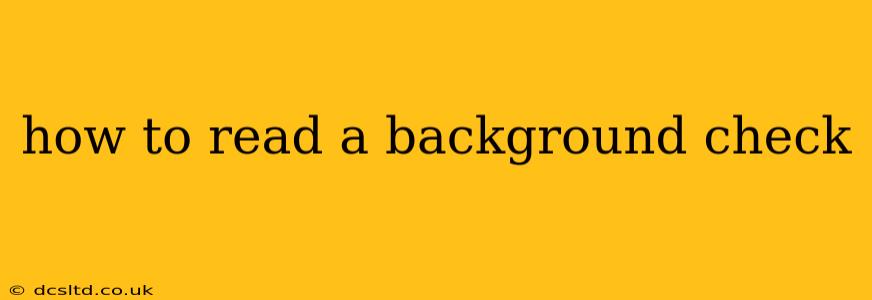Understanding the information contained within a background check can be complex. This guide will walk you through the key components, helping you decipher the results and understand their implications. Whether you're reviewing your own report, assessing a potential employee, or simply curious about the process, this comprehensive guide will provide clarity.
What Information is Typically Included in a Background Check?
A standard background check typically includes several key sections, which may vary slightly depending on the provider and the specific scope of the check. These commonly include:
-
Personal Information: This section verifies the individual's identity using readily available information such as their full legal name, date of birth, social security number, addresses (past and present), and other identifying details. Any discrepancies here should be flagged immediately.
-
Criminal History: This is often the most scrutinized part of the report. It details any criminal charges, arrests, convictions, and sentencing information. Keep in mind that an arrest doesn't necessarily mean a conviction – charges can be dropped or dismissed. The details of each incident, including the date, location, charges, and disposition (e.g., acquitted, convicted, dismissed), are vital.
-
Employment History: This section verifies past employment, typically including job titles, dates of employment, and employer contact information. Inconsistencies between the provided information and the employer's records are often flagged.
-
Education History: This portion verifies educational credentials, such as degrees earned, schools attended, and graduation dates. Similar to employment history, inconsistencies can raise concerns.
-
Credit History (If Applicable): Credit checks, often conducted separately, provide information about an individual's creditworthiness, including credit scores, payment history, outstanding debts, and bankruptcies. This is usually only included with consent.
-
Driving Records (If Applicable): This section reveals driving history, including accidents, violations, and suspensions. This is often relevant for jobs requiring driving or commercial driver's licenses.
How to Interpret the Information
Reading a background check requires careful attention to detail and a nuanced understanding of the information presented. Here are some crucial points to consider:
Understanding the Severity of Criminal Records:
Not all criminal records are created equal. The severity of an offense, the date of the offense, and whether the individual has since demonstrated positive behavior are critical factors to consider. Older, minor offenses might be less impactful than recent or serious crimes.
Distinguishing Between Arrests and Convictions:
Remember, an arrest is not a conviction. An arrest simply indicates that an individual was suspected of committing a crime. A conviction, on the other hand, signifies a formal finding of guilt by a court of law. Pay close attention to the disposition of each incident.
Verifying the Accuracy of the Information:
Background checks are not infallible. Errors can occur. It's crucial to meticulously review the report for any inaccuracies and to follow the procedures provided by the background check provider to challenge incorrect information.
Considering the Context:
The relevance of information in a background check depends heavily on the context. A minor traffic violation may be insignificant for one job but disqualifying for another. The nature of the job and the responsibilities involved should inform your interpretation of the results.
What if I Find Errors or Inaccuracies?
If you identify any errors or inaccuracies in your background check, immediately contact the background check provider to initiate a dispute process. Provide evidence to support your claim and follow their procedures carefully. The Fair Credit Reporting Act (FCRA) grants you rights to dispute inaccurate information.
Frequently Asked Questions (FAQs)
How long does a background check take?
The time it takes to complete a background check varies depending on several factors, including the type of check, the information requested, and the efficiency of the agencies involved. It can range from a few days to several weeks.
What is the cost of a background check?
The cost of a background check depends on the type of check and the information included. Prices vary widely, depending on the service provider and the scope of the investigation.
Can I get my own background check?
Yes, you can obtain your own background check through various consumer reporting agencies. These reports typically cover credit, criminal history, and other relevant information.
Can I see my background check report?
Generally, yes, you have the right to receive a copy of your background check report under the FCRA, particularly if it's used in an employment decision.
By understanding the components of a background check and the context in which the information is presented, you can effectively interpret the results and make informed decisions. Remember to always treat the information responsibly and ethically.
